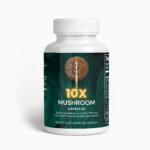
“Managing Mood: Can Supplements Help with Anxiety and Depression?”
Anxiety and depression are two commonly experienced mental health conditions that can be debilitating and greatly impact one’s quality of life. While traditional treatments such as therapy and medication have proven effective, many individuals seek alternative solutions that may include supplements. With the wide range of supplements available claiming to help manage mood, it can be difficult to know which ones are worth considering. In this article, we will explore different supplements commonly used for anxiety and depression and provide evidence-based information to help you make an informed decision about whether they may be helpful for you.
1. Understanding Anxiety and Depression: Managing Your Mood
Anxiety and Depression
Anxiety and depression are conditions that can have a significant impact on a person’s life. These conditions often involve feelings of sadness, hopelessness, and fear. They can also cause physical symptoms such as fatigue, difficulty sleeping, and loss of appetite. Managing these symptoms requires a strong understanding of how anxiety and depression work and what triggers them.
Managing Your Mood
There are several effective ways to manage your mood when dealing with anxiety and depression. One helpful strategy is to practice relaxation techniques such as deep breathing, mindfulness meditation, or progressive muscle relaxation. These techniques can help you reduce stress and anxiety in the moment.
Another way to manage your mood is to engage in regular exercise. Exercise has been shown to boost mood and reduce symptoms of anxiety and depression. It can also promote better sleep and improve overall physical health. Eating a healthy diet and getting enough sleep are also important factors in managing mood.
Seeking Help
While self-care strategies can be helpful in managing anxiety and depression, sometimes it’s necessary to seek professional help. If symptoms persist despite your efforts to manage your mood, it may be time to talk to your doctor about therapy or medication. Therapy can help you identify the underlying causes of your anxiety and depression, and provide you with tools to manage your symptoms. Medication can also be helpful in some cases, particularly if symptoms are severe.
Remember that it’s okay to ask for help when dealing with anxiety and depression. These conditions are common, and many people struggle with them at some point in their lives. With proper management techniques and support, it is possible to overcome these challenges and improve your overall well-being.
2. Are Supplements the Answer to Managing Anxiety and Depression?
Research has shown that supplements may be effective in managing anxiety and depression. While they should not be used as a standalone treatment, supplements can serve as a useful addition to traditional therapies such as medication and talk therapy. One commonly used supplement is omega-3 fatty acids, which have been found to reduce symptoms of depression and anxiety. Other supplements include B-complex vitamins, magnesium, and St. John’s Wort.
However, it’s important to note that supplements are not FDA-regulated like medications. This means the dosage and quality of supplements can vary greatly depending on the brand and manufacturer. It’s important to do your research and read reviews before purchasing any supplements. It’s also important to consult with a healthcare professional to discuss any potential interactions or side effects.
In conclusion, supplements should be viewed as one tool in managing anxiety and depression. They are not a cure and should not be used as a substitute for professional medical treatment. However, with the right research and guidance, supplements can provide a natural and effective way to manage symptoms of anxiety and depression.

3. The Link Between Mood and Nutrition: Exploring the Science
Nutrition plays a significant role in balancing our mood and mental health. The human brain requires essential nutrients to function correctly, and when our diets lack them, it can result in negative effects, such as mood swings and anxiety. Recent scientific research supports this connection between nutrition and mood, explaining how certain foods can positively impact our mental health.
Protein-rich foods, such as quinoa, eggs, and nuts, help boost the production of serotonin, a neurotransmitter that affects our mood, sleep, and appetite. Similarly, foods high in omega-3 fatty acids, such as salmon, walnuts, and chia seeds, are known to enhance brain function and reduce depression. Additionally, consuming complex carbohydrates, such as whole grains and vegetables, helps maintain blood sugar levels while triggering the release of dopamine, a neurotransmitter associated with pleasure and reward.
On the other hand, unhealthy eating habits consisting of processed foods, refined sugars, and trans fats can have detrimental effects on our mood and mental health. Such foods lead to inflammation and oxidant stress in the body, harming the brain function and contributing to the development of mood disorders.
In conclusion, there is a deep connection between the food we eat and our mental health. By incorporating nutrient-rich foods into our diets and staying away from unhealthy foods, we can enhance our brain function, positively impact our mood and overall mental health. Take control of your well-being by making conscious decisions about what you consume every day.
4. Selecting the Right Supplements for Your Mental Health: Empowering Yourself
Proper supplementation can boost your mental health. However, with the numerous supplements out there, it can be an overwhelming task to select the best ones. To empower yourself in making the right decision, consider the following:
- Consult a healthcare provider – it is essential to seek advice from a healthcare professional who is knowledgeable about supplements. They can assess your current medication, medical history, and offer recommendations based on their professional expertise.
- Read the label – it’s important to review the supplement label and ensure it conforms to the safety and quality standards. Look for the certifications such as the United States Pharmacopeia (USP) seal, as they signify that the product is safe for human consumption.
- Determine the ingredients – Different supplements have distinct ingredients that cater to varying mental health needs. For instance, St. John’s Wort supplements enhance serotonin production levels in the brain, thus facilitating the relief of depression.
Additionally, research the supplements to understand if they have any undesirable side effects. Supplements like valerian root, for example, have a sedative effect that can cause dizziness or fatigue. Furthermore, supplement dosages cater to specific age groups or conditions, making it essential to tailor your selection to match the situation. Therefore, remember to keep yourself informed and make informed decisions about the supplements you consume.
In conclusion, selecting the right supplements should be an informed decision. Don’t trust anecdotal information or advertisements without seeking professional advice. Ensure that you read the labels, research the supplements and check the ingredients to understand their effects on your mental health. With the right information, you can choose the right supplements to improve your mental health and lead a fulfilling life.

5. Navigating Supplements: Best Practices for Using Nutrition to Combat Mental Health Issues
Understanding the Benefits of Supplements for Mental Health
Supplements can be a valuable tool in the battle for mental health, providing the necessary nutrients and support needed to combat common mental health issues. They can help increase mood, reduce anxiety and depression, aid in sleep, and increase overall cognitive function. However, it is important to understand that supplements alone are not a cure for mental health issues and should always be used in conjunction with other treatments, such as therapy and medication.
Choosing the Right Supplements for Your Specific Needs
Not all supplements are created equal, and it is important to choose the right one for your specific needs. Researching and reading labels can help you choose the right supplements and ensure that they are safe and effective. Some of the most commonly recommended supplements for mental health include omega-3 fatty acids, B vitamins, vitamin D, magnesium, and probiotics. It is also important to consult with a healthcare provider before starting any new supplements, especially if you are currently taking medication or have pre-existing health conditions.
Maximizing the Benefits of Supplements for Mental Health
To maximize the benefits of supplements for mental health, it is important to take them consistently and at the right dosage. Following the recommended dosage on the label or as advised by your healthcare provider can ensure that you are getting the right amount of nutrients for your individual needs. Additionally, incorporating healthy habits into your daily routine, such as practicing mindfulness, getting regular exercise, and eating a well-balanced diet, can help increase the effectiveness of supplements for mental health. Remember, supplements are a valuable tool in the fight against mental health issues, but they should be carefully researched, chosen, and monitored for optimal results.
6. Supplement Safety: Precautions to Consider Before Taking Any New Supplements
When it comes to taking supplements, you need to be cautious about what you’re putting into your body. While supplements can provide many benefits, they can also cause serious harm if not taken correctly. Here are some precautions to consider before adding any new supplements to your daily regimen:
- Consult with your doctor: Before taking any new supplement, make sure to talk to your doctor first. They can help you determine if it’s safe for you to take and whether it may interact with any medications you’re currently taking. This is especially important if you have any preexisting medical conditions.
- Research the supplement: Take the time to research the supplement you’re considering. Look for reputable sources of information, such as government websites or academic journals, and make sure the supplement has been tested for safety and effectiveness. Be wary of supplements that make grandiose claims or promise quick results.
- Start with a low dose: When taking a new supplement, it’s best to start with a low dose and gradually work your way up. This will help you gauge your body’s reaction and determine if there are any negative side effects. If you experience any adverse effects, stop taking the supplement immediately and consult with your doctor.
Overall, it’s important to approach supplements with caution and do your due diligence before adding them to your everyday routine. By taking these precautions, you’ll be able to enjoy the benefits of supplements safely and without any negative consequences.
7. Achieving Balance: Using Supplements to Support professional Treatment for Anxiety and Depression
There are several types of supplements that can aid in the treatment of anxiety and depression. However, it’s important to note that supplements should not be used as a replacement for professional treatment. Instead, they can be used in conjunction with therapy and medication to achieve balance in your mental health journey.
One type of supplement that has gained popularity in recent years is CBD oil. CBD, short for cannabidiol, is a non-psychoactive compound found in cannabis. It has been shown to have anti-anxiety and anti-depressant properties, making it a promising alternative treatment for those who experience negative side effects from traditional medication. It’s important to note that CBD oil is not regulated by the FDA, so it’s crucial to do thorough research before purchasing and consuming any products.
Another supplement that can aid in the treatment of anxiety and depression is omega-3 fatty acids. These can be found in fatty fish, such as salmon and tuna, as well as in supplement form. Omega-3s have been shown to improve mood and reduce inflammation, making them a great addition to any mental health regimen. It’s recommended to aim for at least 250-500mg of EPA and DHA Omega-3s per day.
Lastly, incorporating adaptogens into your daily routine can also support your mental health. Adaptogens, such as ashwagandha and rhodiola, are herbs that can help the body adapt to stress and modulate the stress response. These herbs have been shown to reduce anxiety and improve mood, making them a great addition to any mental health regimen. It’s important to do research and consult with a healthcare professional before incorporating adaptogens into your routine, as some may interact with medications or have adverse effects.
Mood disorders such as anxiety and depression can be managed through psychological, physical, and dietary means. However, many people are now turning to dietary supplements to help manage mood and symptoms of mental health disorders. There is evidence that certain supplements can be beneficial in treating and managing mental health conditions, but it is important to speak to a doctor before making any changes to your diet. Taking the right supplements can help relieve symptoms of mood disorders and potentially improve quality of life.

























